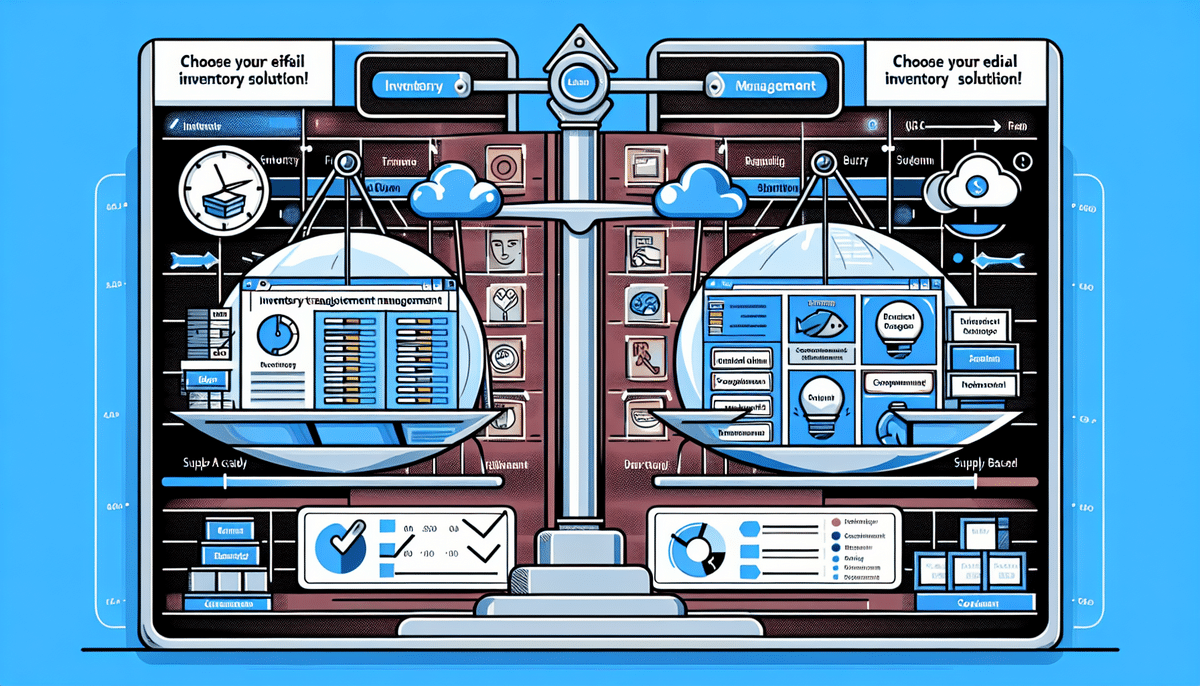Fishbowl Inventory vs NetSuite WMS: Comprehensive SEO Optimized Comparison
Choosing the right inventory management system is crucial for the efficiency and growth of your business. Fishbowl Inventory and NetSuite WMS are two prominent solutions in the market, each offering unique features tailored to different business needs. This article provides an in-depth comparison to help you determine which system aligns best with your operational requirements.
Introduction to Fishbowl Inventory and NetSuite WMS
Fishbowl Inventory is a robust inventory management solution designed primarily for small to mid-sized businesses. It offers functionalities such as inventory tracking, order management, manufacturing modules, and seamless integration with accounting software like QuickBooks.
On the other hand, NetSuite WMS is a cloud-based Warehouse Management System that forms part of the broader NetSuite ERP suite. It caters to businesses of all sizes, providing comprehensive solutions that include inventory management, financial management, customer relationship management, and advanced analytics.
Both systems are highly customizable, allowing businesses to tailor functionalities to their specific needs. However, their focus and scalability differ, making them suitable for varying business sizes and complexities.
Key Features and Functionalities
Fishbowl Inventory's Key Features
- Inventory Tracking: Real-time tracking of inventory levels across multiple locations.
- Order Management: Streamlines order processing from purchase to fulfillment.
- Manufacturing Management: Tools for managing production, bill of materials, and work orders.
- Barcode Scanning: Enhances accuracy and speed in inventory operations.
- Integrations: Seamless integration with QuickBooks, Xero, and other accounting software.
- Mobile Access: Mobile app for inventory management on-the-go.
NetSuite WMS's Key Features
- Cloud-Based Platform: Accessible from anywhere with real-time updates.
- Integrated Financial Management: Combines inventory management with financial operations.
- Advanced Reporting and Analytics: In-depth insights into inventory performance and trends.
- Supply Chain Management: Comprehensive tools for managing the entire supply chain.
- Automation: Automated workflows and processes to enhance efficiency.
- Customization: Highly customizable dashboards and modules to fit business needs.
Pros and Cons of Fishbowl Inventory and NetSuite WMS
Fishbowl Inventory
- Pros:
- Cost-effective for small to mid-sized businesses.
- User-friendly interface with intuitive navigation.
- Strong integration capabilities with accounting software.
- Mobile app enhances flexibility for remote management.
- Cons:
- Limited advanced features compared to larger ERP systems.
- Scalability may be restricted for rapidly growing businesses.
- Basic reporting tools may not meet all analytical needs.
NetSuite WMS
- Pros:
- Comprehensive suite covering multiple business functions.
- Highly scalable, suitable for businesses of all sizes.
- Advanced analytics and real-time data visibility.
- Robust customization options to fit specific business processes.
- Cons:
- Higher cost, which may be prohibitive for smaller businesses.
- Complex setup and longer implementation time.
- Steeper learning curve due to extensive features.
Pricing Comparison Between Fishbowl Inventory and NetSuite WMS
Fishbowl Inventory offers a one-time licensing fee starting at approximately $4,395 for the base license, with additional costs for each user, typically around $1,195 per user. This pricing structure makes it a cost-effective solution for small to mid-sized businesses looking for robust inventory management without recurring subscription fees.
NetSuite WMS operates on a subscription-based model, with pricing starting at around $999 per month for basic packages. Enterprise-level solutions can scale up to $200,000 per year, depending on the number of users, modules, and customization required. This model provides flexibility and scalability, accommodating the needs of rapidly growing businesses but at a higher ongoing cost.
For detailed and up-to-date pricing information, it's recommended to contact the vendors directly or visit their official pricing pages:
User Reviews and Satisfaction Ratings
Understanding user satisfaction can provide deeper insights into how these systems perform in real-world scenarios.
Fishbowl Inventory
Fishbowl Inventory boasts a user satisfaction rating of 4.4 out of 5 on Capterra. Users praise its ease of use, reliable customer support, and seamless integration with accounting software. However, some have noted limitations in advanced reporting and scalability.
NetSuite WMS
NetSuite WMS holds a solid rating of 4.2 out of 5 on Gartner. Users appreciate its comprehensive feature set, real-time data visibility, and scalability. Common criticisms include the higher cost and complexity of implementation.
Overall, both systems are well-regarded, but the choice depends on your specific business needs and budget constraints.
Implementation Process and Integration Capabilities
Implementation Process
Fishbowl Inventory is known for its relatively quick and straightforward implementation process, typically taking a few weeks. This efficiency is beneficial for businesses looking to deploy the system without significant downtime.
In contrast, NetSuite WMS has a more complex implementation process that can span several months. This is due to its extensive customization options and the need to integrate seamlessly with other NetSuite modules and existing business systems.
Integration Capabilities
Both systems offer robust integration capabilities, but they differ in scope and flexibility.
- Fishbowl Inventory: Integrates seamlessly with accounting software like QuickBooks and Xero, e-commerce platforms such as Shopify and Magento, and various shipping carriers like UPS, FedEx, and USPS. This makes it highly versatile for businesses operating in multiple channels.
- NetSuite WMS: Offers extensive integrations not only within the NetSuite ecosystem (ERP, CRM, Ecommerce) but also with third-party applications like Salesforce, Shopify, and various logistics providers. Its API allows for custom integrations, making it suitable for complex and large-scale operations.
Customer Support and Security Measures
Customer Support
Fishbowl Inventory provides customer support through multiple channels, including phone, email, and live chat. They also offer a comprehensive knowledge base, user forums, and training resources to assist users in maximizing the system's potential.
NetSuite WMS offers customer support via email, phone, live chat, and an extensive online knowledge base. Additionally, NetSuite provides dedicated support portals and professional services to aid in implementation and ongoing maintenance.
Security Measures
Both Fishbowl Inventory and NetSuite WMS prioritize data security, integrating the following measures:
- Data Encryption: Ensures that data transmitted and stored within the systems is encrypted.
- Two-Factor Authentication: Adds an extra layer of security for user access.
- Regular Backups: Protects against data loss through systematic backups.
- Compliance: Adheres to industry standards like PCI DSS and GDPR to safeguard sensitive information.
- Access Controls: Restricts data access to authorized personnel only.
These security protocols ensure that businesses can trust both systems with their critical inventory and financial data.
Scalability Options and Industry-Specific Use Cases
Scalability
Fishbowl Inventory offers scalability options suited for growing businesses, including multi-location inventory tracking and advanced forecasting tools. However, its scalability has limits, making it more appropriate for small to mid-sized enterprises.
NetSuite WMS excels in scalability, accommodating businesses from small startups to large enterprises. Its cloud-based infrastructure allows for seamless scaling, supporting increased data volumes, additional users, and expanded functionalities without significant performance drops.
Industry-Specific Use Cases
Different industries have unique inventory management needs, and both systems cater to various sectors:
- Retail and E-commerce: Both Fishbowl Inventory and NetSuite WMS offer integrations with major e-commerce platforms like Shopify and Magento, facilitating efficient order fulfillment and inventory synchronization.
- Manufacturing: Fishbowl’s manufacturing modules support production processes, bill of materials, and work orders, while NetSuite WMS provides comprehensive supply chain management tools.
- Healthcare: NetSuite WMS is well-suited for the healthcare industry, offering strict compliance features and advanced tracking capabilities essential for managing medical inventories.
- Logistics and Transportation: NetSuite’s real-time tracking and reporting enhance efficiency in logistics operations, making it a preferred choice for transportation companies.
Final Thoughts: Choosing the Right Inventory Management Software
When deciding between Fishbowl Inventory and NetSuite WMS, consider the following factors:
- Business Size: Fishbowl is ideal for small to mid-sized businesses, while NetSuite WMS caters to both small businesses and large enterprises.
- Budget: Fishbowl offers a more affordable upfront cost with one-time licensing fees, whereas NetSuite’s subscription model may be more suitable for businesses that prefer scalable, ongoing investments.
- Feature Requirements: Evaluate the specific features your business needs, such as advanced analytics, comprehensive supply chain management, or manufacturing capabilities.
- Implementation Time: If a quick implementation is crucial, Fishbowl may be the better option. For businesses willing to invest time for a more comprehensive system, NetSuite is advantageous.
- Integration Needs: Assess how well each system integrates with your existing tools and platforms to ensure seamless operations.
Ultimately, the choice hinges on aligning the software’s strengths with your business’s unique requirements and growth plans.
Conclusion: Making an Informed Decision
Both Fishbowl Inventory and NetSuite WMS are powerful inventory management solutions, each excelling in different areas. Fishbowl Inventory offers a cost-effective, user-friendly option for small to mid-sized businesses with robust integration capabilities. In contrast, NetSuite WMS provides a comprehensive, scalable solution suitable for businesses that require extensive features and are prepared for a more significant investment.
Carefully assess your business needs, budget, and long-term goals to determine which system will best support your inventory management processes. Leveraging the right system will enhance operational efficiency, provide valuable insights, and drive business growth.






















